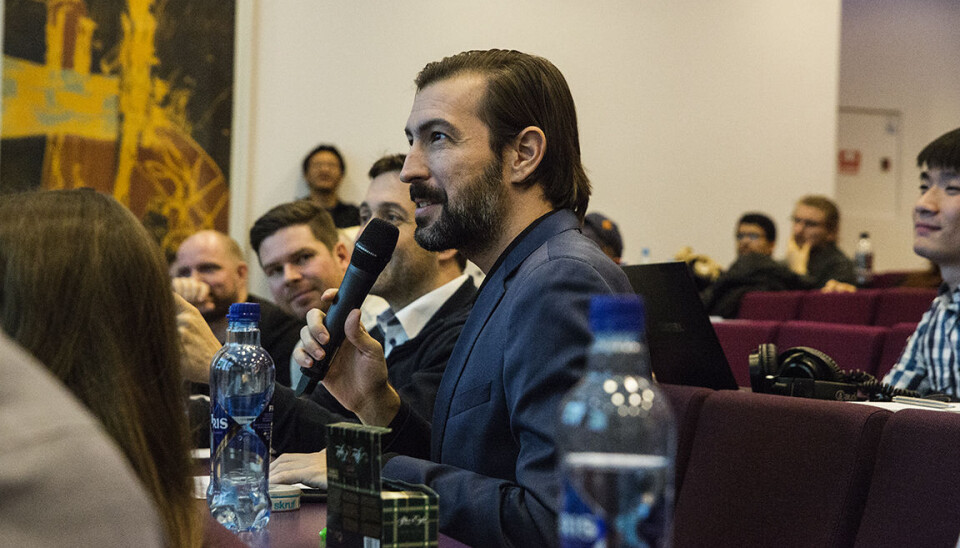-

Leder data og KI | SpareBank 1 Forvaltning
-

Arkitekt | SpareBank 1 Forvaltning
-

Head of Community Arena – Collektivet i Construction City | OBOS
-

Senior forretningsutvikler / produktleder - konsulent (2 stillinger) | Kadabra
-

Senior Security Engineer | Firi
-

Senior Software Engineers - Frontend & Backend | Hornet
-

Medeier* | Boitano
-

Engineering Manager | Handelsbanken
-

Erfaren mobilapp-utvikler | Handelsbanken
-

Fullstack-utvikler | Norad

Ask an Investor: Should my startup work with a large corporate?
Sean Percival is an American investor and entrepreneur with investments in over 120 early-stage startups. Formerly a partner at 500 Startups, today he works with X2 Labs, The Katapult Accelerator, and several startups in Oslo. Here, on Shifter he gives candid answers to common founder questions.
Vidar was nervous sitting in the swanky meeting room of a large Norwegian corporation one fine Monday morning. It was just him, his simple slide presentation and a warm cafe latte. They always have those fancy coffee machines with touch screens at big corporations. Vidar thought, if nothing else comes from this meeting, at least he got a good cup of coffee. Vidar is your typical humble Norwegian founder; sometimes, he is also a fool.
He was significantly more excited when the email came in last week from that large Norwegian corporation. Let’s just call it Belenor. He had been plugging away on his idea for a good two years, and now, finally, big ol’ Belenor was calling. It is, of course, the largest provider of data communications and brown cheese in the Nordics, in addition to several other emerging countries where it was easy to create a monopoly on the local brown cheese market.
Vidar wasn’t sure exactly why they were interested in his app, a Tinder-like platform for matching you up with the right nachspiel party. Nevertheless, so began one of the business world’s most awkward dances. The startup-to-corporate tango.
After many years of hibernation on their big corporate campuses, large Norwegian companies are now more than ever engaging with startups. Overall, this is a good thing, but what should you do if your baby startup gets approached by one of these big dinosaurs?
The Startup Petting Zoo
As you start talking to corporations, it’s important to remain calm and patient. This is a dance that takes a long time, so at meeting #1, you are a long way from seeing any value or opportunity in a partnership. This is further delayed by the amount of “Startup Tourism” or “Startup Petting Zoo” behaviors corporations often exhibit.
Most of the time, corporate types are just looking around, seeing the sites and, in rare cases, getting close enough to pet a startup. They’re not ready to jump in, but they really need some inspiration or just some content for an upcoming presentation to the boss. They’ll talk and meet, but mostly it’s a learning experience. They’re picking up a few more buzzwords and new angles to pitch innovation within their large organizations. Or they might even be building internal knowledge for a future business line at their company.
This is a bad place for most startups to be in, that is, educating the market on what they’re building. It’s a huge distraction and doesn’t often lead to any tangible value for either party. Or the value exchange is lopsided, and you end up telling the corporation how to build its next product without you. So it’s much better for you, the founder, to start getting greedy and focused on value creation for your startup from the onset.
Raiding the Corporations
Aside from fancy touch-screen coffee machines, what can corporations offer? Just two things really. Money, in the form of investment or by paying for your services. Second, access to their customers by marketing your product through their channels. Anything else is likely not going to generate much real value for your startup.
Getting direct investment from a large corporation is going to be tough or impossible. In most cases, corporations aren’t set up to engage startups in this way. They don’t like to hold and manage equity, especially in small startups. So unless they have a dedicated venture fund, you’re not likely to be successful here. This is why it’s typically better to focus on the corporation as a paying user of your product.
This mostly applies to SaaS or B2B companies, which are usually best suited to engage corporations. For these types of businesses, a partnership allows both parties to get to know each other but, most important, it gets some money moving. As we like to say, “some skin in the game." Once this happens, even with a small amount, both parties are much more engaged and focused on a successful partnership.
Poke around the big corporate dinosaur, and find out what its typical process is for purchasing services. Ask direct questions about its needs, and present simple, low-overhead ways it can use your product. Avoid heavy integrations whenever possible or anything that will delay the corporation's seeing the value of your product. As a final pro tip, find out what the corporation's threshold is for purchasing services without requiring too much approval. If, for example, anything above 50,000 NOK requires more approvals, offer something for 49,999 NOK.
For consumer-focused startups, it’s usually more difficult to find a meaningful match. A corporation can provide access to its large user bases, but it’s important that you can convert some of those users into your own. Many times, partnerships like this offer short-term PR value but are not are not scalable for either party.
But what if the big, mean corporation steals my idea?
There has been no shortage of rumblings and rumors about corporations mistreating startups in Norway, although I don’t think Norwegian firms are any worse than those in other markets. In fact, you are significantly less likely to be screwed over in Norway. This is a country of trust, and people here are generally of high integrity. That being said, corporations sometimes do big, mean corporate things.
This is why it’s important to quickly get to a value exchange and/or money trading hands. If you’re meeting the same corporation over and over for 2+ years, there’s always a chance you’re educating them too much. It takes corporations a long time to launch new products, so being able to watch how you develop over a longer timeline helps them greatly.
Also remember, corporations usually can't steal your idea because it’s too difficult for them to take risks and be nimble. That’s your whole advantage as a startup: You can do things they just can't. The biggest part of that is execution itself. Execution is everything. So if you move so slow on your own product that a big corporation beats you to market, whose fault is that really? Sounds as if you spent too much time in coffee meetings and not enough time scaling your business.
In closing, working with a large Norwegian corporation can give your startup a significant boost. At the same time, it can drag you down or worse, educate the corporation on how to beat you in the market. Proceed with caution, and don’t lose sight of your core mission: building your own business, your way.
Vil du høre fra Sean Percival? Husk å sette av 20. april, for da går vi «live» med konferansen The Shift– stedet å være denne våren for alle som bygger fremtidens selskaper. Dit kommer blant annet den tidligere lederen for 500 Nordics:

Foruten Percival og en lang rekke ledende norske gründere kommer gründeren av Indiegogo, investorer fra Creandum, Northzone, Point Nine Capital, Bauer Venture Partners, EQT Ventures og mange, mange flere. Growth hacking, salg, funding, rekruttering og teknologi – og det du måtte trenge av triks og tips fra noen av de beste hodene.
Følg oss på Facebook og Twitter. Og meld deg på nyhetsbrevet vårt.



